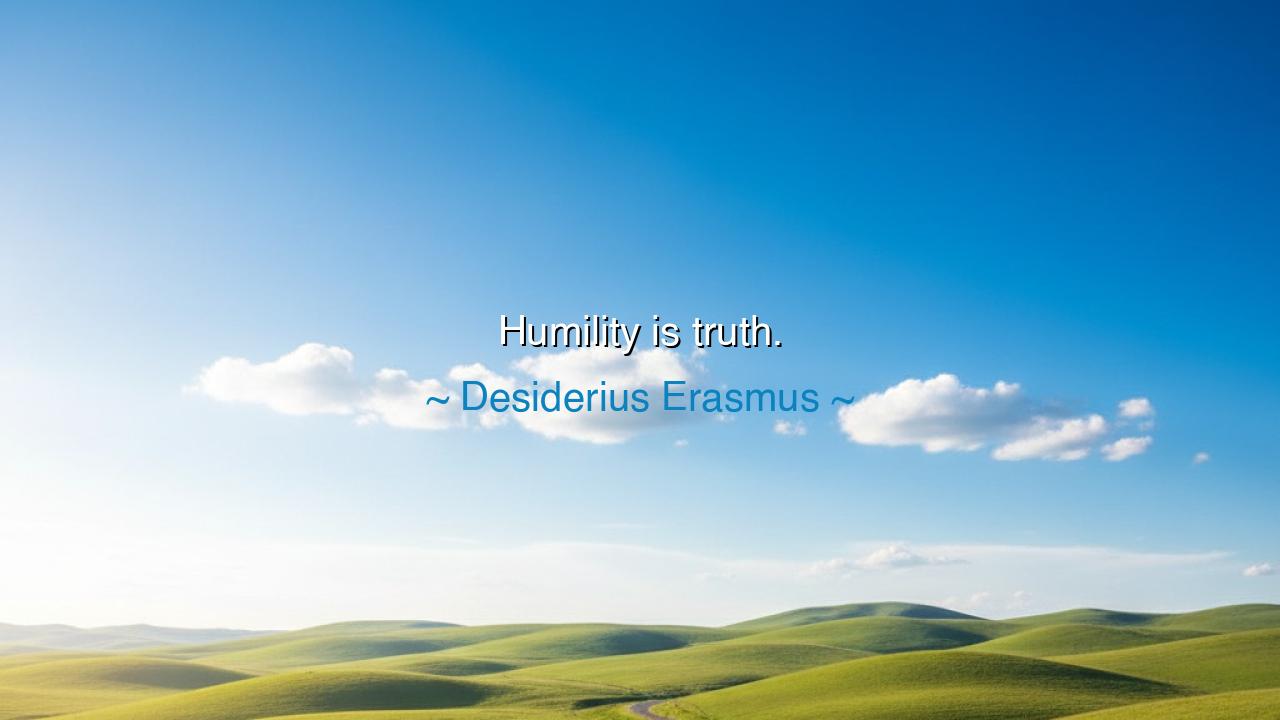
Humility is truth.






Hear the words of Erasmus, that scholar of the Renaissance who wove wisdom into the very fabric of his age: “Humility is truth.” In this brief utterance lies a teaching as deep as the oceans, as simple as a child’s smile, and as difficult as the labor of a lifetime. For what is humility, if not the courage to see ourselves as we truly are? To cast aside illusions of grandeur, yet also to refuse the shackles of false shame. It is to stand before the mirror of existence and say, “This is what I am—no more, no less.”
Erasmus spoke in an age when the world was trembling between old faith and new reason, when pride of power and the corruption of authority weighed heavily upon men’s souls. His cry, “Humility is truth,” was not the soft counsel of weakness, but the sharp sword of reality. For he knew that to be humble is not to bow in humiliation, but to stand firmly upon the ground of honesty. The proud man builds castles of lies around his name; the humble man walks freely, for he has nothing to defend but the truth of his being.
Think upon the example of Abraham Lincoln, born in poverty, clad in rough garments, mocked for his awkward frame. He did not pretend to be other than he was. In his rise to the highest office of his land, he bore himself with humility—listening, reflecting, admitting error when error was shown. Yet this very truthfulness gave him strength greater than armies. His humility was not weakness, but clarity: the power to see the nation’s wounds as they were, and to heal them with words that still echo through time.
Consider also the scientist Michael Faraday, son of a blacksmith, with little schooling. He entered the world of science not with boasts of learning, but with a humble willingness to study, to serve, to learn step by step. His humility opened doors that arrogance would have shut. It allowed him to stand before mysteries without presumption, and in doing so, he uncovered the laws of electromagnetism, lighting the path for all who came after. By acknowledging his smallness before the vastness of creation, he became great.
The lesson is clear, O seekers of wisdom: humility is not abasement, but alignment. It is the refusal to flee from reality. It is the courage to confess ignorance, so that knowledge may enter. It is the strength to admit fault, so that healing may begin. In this way, humility and truth are one, for both demand that we strip away illusion and dwell in what is.
Let no man deceive himself into thinking that pride builds power. Pride is a mask, and all masks crack in time. The mighty who exalt themselves upon lies fall harder than those who walked in quiet truth. The humble endure, for they are rooted in what is eternal. They are like trees with deep roots: bent by storms, yet never torn from the earth.
Therefore, children of tomorrow, practice humility in your daily life. When praised, give thanks but do not inflate your heart. When corrected, receive it with gratitude, for it is a gift that clears your path. When tempted to boast, remember the fleeting nature of glory, and instead anchor yourself in the steady light of truth. Speak honestly, act sincerely, and treat each soul as equal upon the stage of existence.
In this way, you shall live the teaching of Erasmus. You shall find freedom not in pretense, but in reality. And walking humbly in the radiance of truth, you shall leave behind not the brittle echo of pride, but a legacy that endures like stone, shining in the memory of generations yet unborn.






VTNguyen Van Thang
I’ve often heard people say that humility is a virtue, but could it be more than just a moral stance? If humility is truth, does it mean that truth is something we must actively seek? Maybe humility requires us to constantly challenge our understanding of the world and ourselves. How do we cultivate this kind of humility? Is it a conscious effort or something that happens naturally with experience?
TNNguyen Thi Thanh Ngan
It’s hard not to think about the paradox of humility being truth. On one hand, it’s almost like saying that being humble is simply acknowledging reality. But on the other hand, does this mean that people who don’t exhibit humility are not seeing things clearly? What role does perception play in humility? Can someone truly be humble without recognizing their own biases?
NDNgoc Dieu
I wonder if humility is also tied to our relationship with others. Can we be humble without recognizing the truth in others? If we only see things from our own perspective, isn’t that a form of pride? Perhaps humility isn’t just about being truthful to ourselves, but also acknowledging the truth in those around us, without judgment or superiority.
MTMinh Thu
What if humility is not just about being modest in our actions, but more about embracing the reality of who we are and where we stand? I wonder if the more we understand the truth about ourselves and the world around us, the more humble we become. It's like seeing things clearly without the lens of pride distorting them. Does that mean that humility is actually a form of wisdom?
TDnguyen dinh tien dat
Isn't it interesting how humility and truth are often seen as opposites in today's world? People tend to equate humility with weakness, but could it actually be a sign of strength? To acknowledge the truth, especially about ourselves, requires a kind of inner strength. Could this be the real meaning of humility – being strong enough to face the truth, no matter how hard it might be?